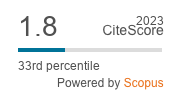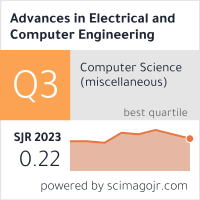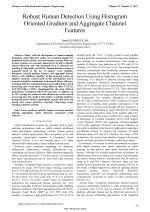| 2/2023 - 11 |
Robust Human Detection Using Histogram Oriented Gradient and Aggregate Channel FeaturesSONMEZOCAK, T. |
| View the paper record and citations in |
| Click to see author's profile in |
| Download PDF |
Author keywords
gradient methods, image processing, machine learning algorithms, object detection, unmanned aerial vehicles
References keywords
detection(16), vision(9), tracking(8), pedestrian(8), object(8), visual(6), robust(6), pattern(6), features(6), applications(5)
Blue keywords are present in both the references section and the paper title.
About this article
Date of Publication: 2023-05-31
Volume 23, Issue 2, Year 2023, On page(s): 93 - 100
ISSN: 1582-7445, e-ISSN: 1844-7600
Digital Object Identifier: 10.4316/AECE.2023.02011
Web of Science Accession Number: 001009953400011
SCOPUS ID: 85164326974
Abstract
Today, with the development of camera imaging techniques, object detection studies are becoming popular for unmanned aerial vehicles and autonomous systems. However, in these systems, it is extremely important to be able to identify objects effectively and with minimum error in detection for tracking. In this study, an effective human detection system is proposed based on the use of support vector machine, histogram oriented gradient features, and aggregate channel features with AdaBoost classifier. In this proposed system, an adaptive attention system based on the convolutional neural network GoogleNet architecture is developed. Hence efficiency in human detection and monitoring is increased and the central processing unit works faster. Using different data (UAV123, UAV123@10fps, COCO, OpenImagesV6) the most efficient performance is obtained with 97.4% accuracy. In addition, up to 75% savings are achieved with efficient use of the central processing unit. The model in this study is a suitable model for unmanned aerial vehicles, autonomous systems that carry out search and rescue activities, especially close-range target tracking in defense systems. |
| References | | | Cited By «-- Click to see who has cited this paper |
| [1] H. Sabirin, M. Kim, "Moving object detection and tracking using a spatio-temporal graph in H. 264/avc bitstreams for video surveillance," IEEE Trans. Multimedia, vol. 14, pp. 657-668, 2012. [CrossRef] [Web of Science Times Cited 40] [SCOPUS Times Cited 49] [2] B. Jiang, Y. Zhang, J. Tang, B. Luo, C. Li, "Robust visual tracking via laplacian regularized random walk ranking," Neurocomputing 339, pp. 139-148, 2019. [CrossRef] [Web of Science Times Cited 11] [SCOPUS Times Cited 11] [3] H. Lee, S. H. Park, J. H. Yoo, S. H. Jung and J. H. Huh, "Face recognition at a distance for a stand-alone access control system," Sensors, vol. 20, no. 3, 2020. [CrossRef] [Web of Science Times Cited 38] [SCOPUS Times Cited 47] [4] I. Martinez-Alpiste, G. Golcarenarenji, Q. Wang, J. M. Alcaraz-Calero, "Altitude-adaptive and cost-effective object recognition in an integrated smartphone and UAV system," in European Conference on Networks and Communications, pp. 316-320, 2020. [CrossRef] [Web of Science Times Cited 6] [SCOPUS Times Cited 6] [5] I. Martinez-Alpiste, G. Golcarenarenji, Q. Wang, J. M. Alcaraz-Calero, "Search and rescue operation using UAVs: A case study," Expert Systems with Applications, vol. 178, Article 114937, 2021. [CrossRef] [Web of Science Times Cited 56] [SCOPUS Times Cited 72] [6] X. Yu, Y. Gong, N. Jiang, Q. Ye, Z. Han, "Scale match for tiny person detection," in IEEE Winter Conference on Applications of Computer Vision, pp. 1257-1265, USA, 2020. [CrossRef] [SCOPUS Times Cited 197] [7] P. Rudol, P. Doherty, "Human body detection and geolocalization for UAV search and rescue missions using color and thermal imagery," in IEEE Aerospace Conference, pp. 1-8, 2008. [CrossRef] [SCOPUS Times Cited 238] [8] R. Girshick, "Fast R-CNN," In Proceedings of the IEEE International Conference on Computer Vision, pp. 1440-1448, Chile, 2015. [CrossRef] [Web of Science Times Cited 15092] [SCOPUS Times Cited 21159] [9] L. Chengyang, D. Song, R. Tong, M. Tang, "Illumination-aware faster R-CNN for robust multispectral pedestrian detection," Pattern Recognition, pp. 161-171, 2019. [CrossRef] [Web of Science Times Cited 247] [SCOPUS Times Cited 309] [10] J. Redmon, A. Farhadi, "Yolov3: An incremental improvement," Computer Vision and Pattern Recognition, 2018. [CrossRef] [11] Y. Xue, Z. Ju, Y. Li, W. Zhang, "MAF-YOLO: Multi-modal attention fusion based YOLO for pedestrian detection," Infrared Physics & Tech., 2021. [CrossRef] [Web of Science Times Cited 35] [SCOPUS Times Cited 40] [12] G. Golcarenarenji, I. Martinez-Alpiste, Q. Wang, J. M. Alcaraz-Calero, "Illumination-aware image fusion for around-the-clock human detection in adverse environments from unmanned aerial vehicle," Expert Systems with Applications, vol. 204, 2022. [CrossRef] [Web of Science Times Cited 7] [SCOPUS Times Cited 7] [13] L. Weibo, Z. Wang, X. Liu, N. Zeng, Y. Liu et al., "A survey of deep neural network architectures and their applications," Journal of Neurocomputing, vol. 234, pp. 11-26, 2017. [CrossRef] [Web of Science Times Cited 1977] [SCOPUS Times Cited 2527] [14] R. Alharbey, A. Banjar, Y. Said, M. Atri, A. Alshdadi, M. Abid, "Human faces detection and tracking for crowd management in hajj and umrah," Computers, Materials and Continua, vol. 71, no. 3, pp. 6275-6291, 2022. [CrossRef] [Web of Science Times Cited 6] [SCOPUS Times Cited 6] [15] D. Elayaperumal, Y. H. Joo, "Aberrance suppressed spatio-temporal correlation filters for visual object tracking," Pattern Recogn. vol. 115, 2021. [CrossRef] [Web of Science Times Cited 32] [SCOPUS Times Cited 38] [16] S. Moorthy, J. Y. Choi, Y. H. Joo, "Gaussian-response correlation filter for robust visual object tracking," Neurocomputing, vol. 411, pp. 78-90, 2020. [CrossRef] [Web of Science Times Cited 26] [SCOPUS Times Cited 29] [17] T. Xu, Z. Feng, X. J. Wu, J. Kittler, "Adaptive channel selection for robust visual object tracking with discriminative correlation filters," Int. J. Comput. Vision, vol. 129, pp. 1359-1375, 2021. [CrossRef] [Web of Science Times Cited 51] [SCOPUS Times Cited 60] [18] D. Elayaperumal, Y. H. Joo, "Robust visual object tracking using context-based spatial variation via multi-feature fusion," Information Sciences, vol. 577, pp. 467-482, 2021. [CrossRef] [Web of Science Times Cited 24] [SCOPUS Times Cited 27] [19] J. Zhang, X. Jin, J. Sun, J. Wang, A. K. Sangaiah, "Spatial and semantic convolutional features for robust visual object tracking," Multimedia Tools and Applications, vol. 79, pp. 15095-15115, 2020. [CrossRef] [20] J. Kim, J. Baek, E. Kim, "A novel on-road vehicle detection method using ÏHOG," IEEE Trans. Intell. Transp. Syst. vol. 16, no. 6, pp. 3414-3429, 2015. [CrossRef] [Web of Science Times Cited 14] [SCOPUS Times Cited 52] [21] T. Sonmezocak, "CNN-based human detection with multi-channel features for unmanned aerial vehicles," III. International Congress of Health, Eng. & Sci., 14-16 October 2022, Ãanakkale, Turkey. [22] C. Szegedy et al., "Going deeper with convolutions," in Proc IEEE Conf. Comput. Vision Pattern Recognit., pp. 1-9, 2015. [CrossRef] [Web of Science Times Cited 15898] [SCOPUS Times Cited 37438] [23] L. Balagourouchetty, J. K. Pragatheeswaran, B. Pottakkat, G. Ramkumar, "GoogLeNet-based ensemble FCNet classifier for focal liver lesion diagnosis," IEEE Journal of Bio. And Health Inf. 24(6), 1686-1694, 2020. [CrossRef] [Web of Science Times Cited 54] [SCOPUS Times Cited 75] [24] C. Szegedy, V. Vanhoucke, S. Ioffe, J. Shlens, Z. Wojna, "Rethinking the inception architecture for computer vision," in Proc. IEEE Conf. Comput. Vision Pattern Recognit., pp. 2818-2826, USA, 2016. [CrossRef] [Web of Science Times Cited 15296] [SCOPUS Times Cited 22176] [25] J. Hua, Y. Siha, C. Xie, H. Zhang, J. Zhang, "Pedestrian-and vehicle-detection algorithm based on improved aggregated channel features," Journals & Magazine IEEE Access, vol. 9, pp. 25885-25897, 2021. [CrossRef] [Web of Science Times Cited 10] [SCOPUS Times Cited 15] [26] P. Dollar, R. Appel, S. Belongie, P. Perona, "Fast feature pyramids for object detection," IEEE Trans. on Pattern Analy. And Machine Int. vol. 36, pp. 1532-1545, 2014. [CrossRef] [Web of Science Times Cited 1363] [SCOPUS Times Cited 1734] [27] P. Dollar, Z. Tu, P. Perona, S. Belongie, "Integral channel features," Proc. British Machine Vision Conf. (BMVC), 2009. [CrossRef] [SCOPUS Times Cited 1035] [28] G. Li, C. Zong, G. Liu, T. Zhu, "Application of convolutional neural network (CNN)-AdaBoost algorithm in pedestrian detection," Sensors and Materials, vol. 32, pp. 1997-2006, 2020. [CrossRef] [Web of Science Times Cited 9] [SCOPUS Times Cited 9] [29] T. Zin, P. Tin, H. Hama, "Bundling multislit-HOG features of near-infrared images for pedestrian," Fourth International Conference on Innovative Computing Information and Control, pp. 302-306, 2009. [CrossRef] [SCOPUS Times Cited 9] [30] J. Dong, J. Ge, Y. Luo, "Nighttime pedestrian detection with near infrared using cascade classifiers," IEEE International Conference on Image Processing, pp. 185-189, 2007. [CrossRef] [SCOPUS Times Cited 14] [31] S. Bakheet, "An SVM Framework for magnant melanoma detection based in optimized HOG features," Journal of Computation, 2017. [CrossRef] [Web of Science Times Cited 60] [SCOPUS Times Cited 85] [32] F. Suard, A. Rakotomamonjy, A. Bensrhair, A. Broggi, "Pedestrian detection using infrared images and histograms of oriented gradients," IEEE Intelligent Vehicles Symposium, Japan, pp. 206-212, 2006 [33] P. Govardhan, U. C. Pati, "NIR image based pedestrian detection in night vision with cascade classification and validation," IEEE International Conference on Advanced Communication Control and Computing Tech., 2014. [CrossRef] [SCOPUS Times Cited 26] Web of Science® Citations for all references: 50,352 TCR SCOPUS® Citations for all references: 87,490 TCR Web of Science® Average Citations per reference: 1,481 ACR SCOPUS® Average Citations per reference: 2,573 ACR TCR = Total Citations for References / ACR = Average Citations per Reference We introduced in 2010 - for the first time in scientific publishing, the term "References Weight", as a quantitative indication of the quality ... Read more Citations for references updated on 2024-10-21 21:36 in 209 seconds. Note1: Web of Science® is a registered trademark of Clarivate Analytics. Note2: SCOPUS® is a registered trademark of Elsevier B.V. Disclaimer: All queries to the respective databases were made by using the DOI record of every reference (where available). Due to technical problems beyond our control, the information is not always accurate. Please use the CrossRef link to visit the respective publisher site. |
Faculty of Electrical Engineering and Computer Science
Stefan cel Mare University of Suceava, Romania
All rights reserved: Advances in Electrical and Computer Engineering is a registered trademark of the Stefan cel Mare University of Suceava. No part of this publication may be reproduced, stored in a retrieval system, photocopied, recorded or archived, without the written permission from the Editor. When authors submit their papers for publication, they agree that the copyright for their article be transferred to the Faculty of Electrical Engineering and Computer Science, Stefan cel Mare University of Suceava, Romania, if and only if the articles are accepted for publication. The copyright covers the exclusive rights to reproduce and distribute the article, including reprints and translations.
Permission for other use: The copyright owner's consent does not extend to copying for general distribution, for promotion, for creating new works, or for resale. Specific written permission must be obtained from the Editor for such copying. Direct linking to files hosted on this website is strictly prohibited.
Disclaimer: Whilst every effort is made by the publishers and editorial board to see that no inaccurate or misleading data, opinions or statements appear in this journal, they wish to make it clear that all information and opinions formulated in the articles, as well as linguistic accuracy, are the sole responsibility of the author.





